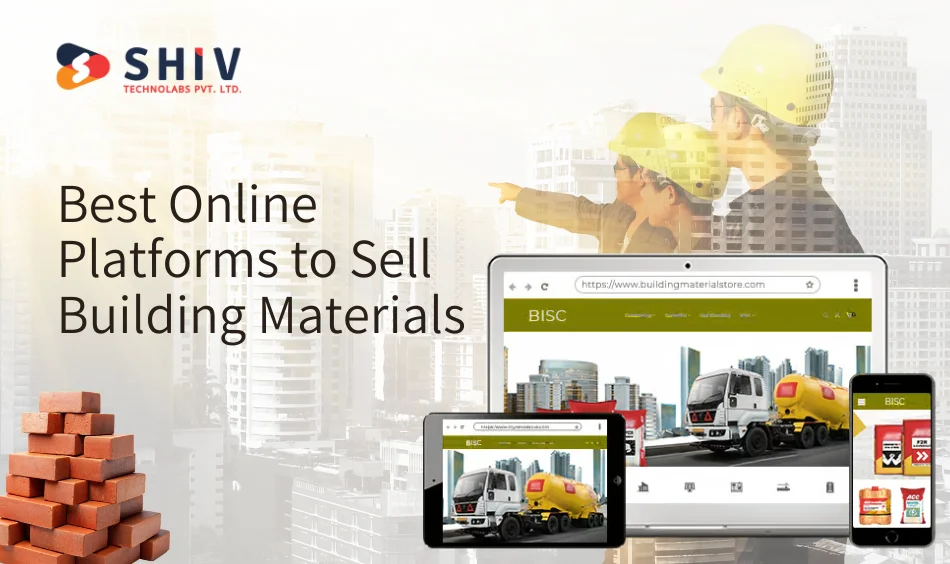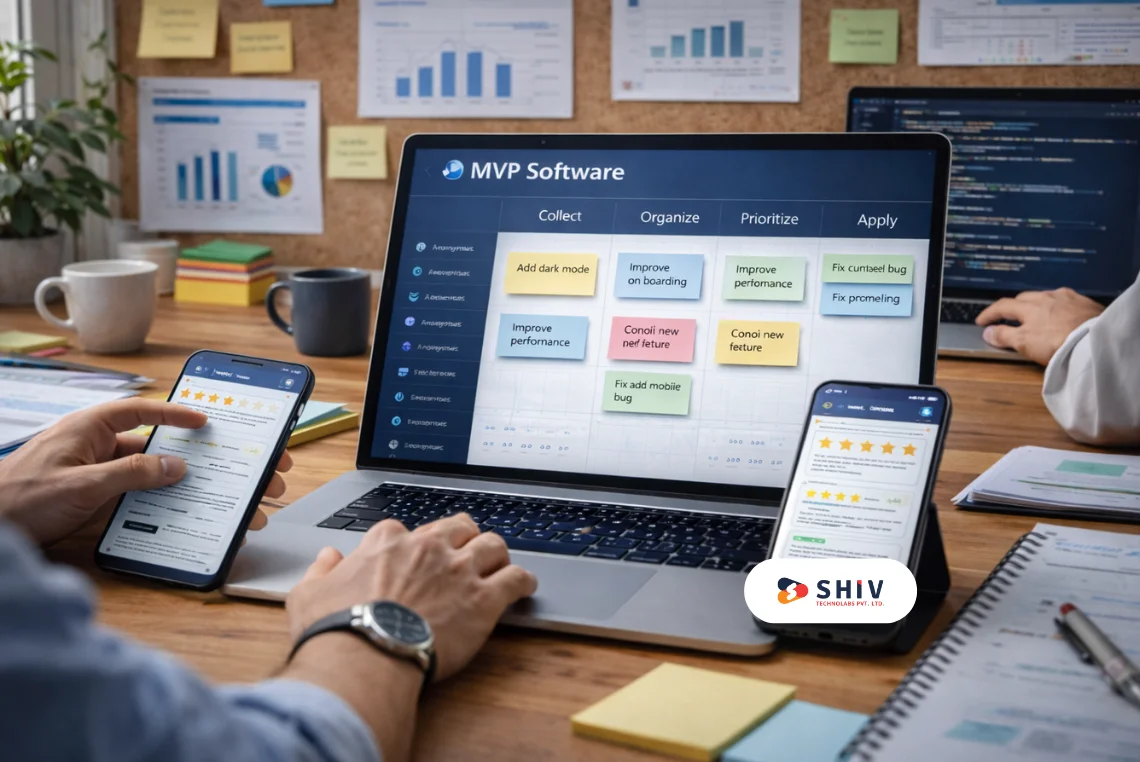Table of Contents
Did you know that currently 49% of all B2B spending is done online, and this share is expected to rise to 57% over the next five years?
This shift is not just about convenience; it reflects how the construction supply chain is adapting to digital demand.
Selling building materials online in 2025 is no longer optional—it’s a fast-growing channel that connects suppliers directly with builders, architects, and even DIY homeowners.
Selling building materials online provides direct access to contractors, architects, retailers, and even homeowners who prefer quick and reliable sourcing.
From large marketplaces to custom-built eCommerce websites and mobile apps, sellers now have multiple channels to grow their reach and strengthen customer relationships.
Why Selling Building Materials Online Makes Sense?
Construction projects depend on speed and reliability. Buyers expect quick access to suppliers who can deliver the right materials without unnecessary delays. Just like everyday shopping has shifted online, the same pattern is shaping how contractors, builders, and even homeowners source their products.
For suppliers, moving online is more than just listing items—it’s about meeting customers where they already spend their time. Digital platforms give greater visibility, build trust, and allow sellers to serve both large contractors and small individual buyers.
Whether you are a wholesaler or manufacturer, choosing the right platform helps you build long-term relationships and capture consistent demand.
Best Online Platforms to Sell Building Materials

The right platform can make all the difference in reaching contractors, builders, and individual buyers. Each option comes with its own strengths, from bulk-friendly features to global reach. Let’s look at the leading choices.
1. Your Own eCommerce Website – Full Control Over Sales
Selling building materials through your own eCommerce website gives you unmatched control compared to third-party marketplaces.
Instead of competing with hundreds of other suppliers on the same platform, you build a space dedicated only to your products and brand.
This allows you to highlight your strengths—whether it’s high-quality materials, reliable delivery, or custom bulk pricing.
An independent website also creates a direct line to your buyers. Contractors and builders can place repeat orders without distractions, while homeowners gain confidence by purchasing directly from the source.
With features like online catalogs, instant quotes, and payment gateways, your website becomes more than just a store—it becomes a hub for long-term customer relationships.
Why it works for sellers:
- No dependency on third-party commissions or rules
- Full freedom to design catalog, pricing, and promotions
- Builds lasting brand identity and customer trust
- Enables repeat orders and loyalty programs
- Easy to integrate with logistics, invoicing, and ERP systems
2. Custom Mobile App – Direct Access to Buyers
Building a mobile app gives building material suppliers a unique way to stay closer to their customers. Contractors, retailers, and even homeowners often need to place repeat orders, and an app makes that process quick and convenient.
Instead of browsing a website or searching on a marketplace, buyers can open the app, check availability, and order within minutes.
Unlike marketplaces where you compete for attention, a mobile app creates a dedicated space for your brand. You can send push notifications about stock arrivals, special discounts, or delivery updates—keeping your business top of mind.
Over time, this kind of direct communication builds stronger loyalty and encourages bulk orders from returning customers.
Why it works for sellers:
- Offers buyers a faster and easier ordering experience
- Strengthens long-term customer loyalty
- Push notifications keep clients updated on stock and deals
- Helps contractors place bulk or repeat orders effortlessly
- Positions your brand as modern and customer-focused
3. B2B Marketplaces with ERP & Integration Needs
Platforms such as Handshake (by Shopify) and Global Sources are built specifically for wholesale transactions.
These marketplaces attract verified buyers who purchase in bulk, often contractors, regional distributors, and retail stores. Unlike retail-focused sites, these buyers expect contract pricing, tiered discounts, and reliable fulfillment.
The challenge many suppliers face on these platforms is keeping inventory, pricing, and invoices in sync. This is where ERP integration becomes essential.
By connecting systems like Odoo, SAP, or NetSuite, suppliers can manage thousands of SKUs, generate invoices automatically, and track deliveries without manual effort.
In short, B2B marketplaces combined with ERP integration give suppliers a professional, scalable channel for long-term business growth.
Why it works for sellers:
- Verified buyers looking for wholesale deals
- Bulk pricing and repeat contracts fit well here
- ERP integrations simplify complex operations
4. Social Commerce – Facebook Shops & Instagram Shops
Social commerce is reshaping how buyers discover and purchase building materials. Contractors and homeowners often start with visual research—checking tiles, flooring, paints, or lighting designs on Instagram or Facebook.
With Facebook Shops and Instagram Shops, sellers can showcase their products directly within these platforms and even enable instant checkout.
The advantage of social commerce is visibility: your products appear where buyers are already scrolling. Sellers can run targeted ads, highlight seasonal offers, and build trust through reviews and engagement.
However, to make social selling smooth, integration with eCommerce platforms like Shopify is often needed. This keeps stock, pricing, and orders updated across all channels, avoiding the risk of overselling. For building material suppliers, this is a practical way to combine visibility with convenience.
Why it works for sellers:
- Direct sales within popular social apps
- Great for products with visual appeal
- Integrates with Shopify for better order management
5. Niche Construction Platforms – Architizer & BuildZoom
While general marketplaces cast a wide net, niche platforms like Architizer and BuildZoom focus exclusively on construction and architecture.
These websites attract professionals—architects, contractors, builders—who are actively seeking trusted suppliers for ongoing projects. That makes them valuable for sellers with quality materials and the ability to handle large orders.
On these platforms, success depends on presenting your catalog professionally and managing client relationships effectively. This is where custom software solutions become useful—supplier dashboards, AI-driven recommendations, and CRM integrations can make the process more efficient.
For example, architects might get automated suggestions for related products (tiles matching flooring, insulation matching wall panels), while contractors could access bulk pricing directly. By combining niche visibility with digital tools, suppliers can secure long-term contracts instead of just one-off sales.
Why it works for sellers:
- Focused audience of industry professionals
- Higher-value project-based transactions
- Scope for AI and custom portals to strengthen engagement
6. Private Wholesale Portals & Custom Apps
Some suppliers don’t want to depend on external marketplaces at all. Instead, they invest in private wholesale portals or custom mobile apps designed only for their loyal buyers. These platforms let contractors, builders, and distributors place orders directly without distractions from competitors.
A private portal gives suppliers the freedom to create custom catalogs, bulk pricing models, and contract-based sales. A mobile app adds even more convenience—buyers can reorder materials, check delivery status, or request quotes instantly.
Features like ERP integration ensure stock levels are accurate, while CRM features allow suppliers to maintain strong client relationships. Over time, these portals and apps become powerful tools for building loyalty and driving repeat revenue.
Why it works for sellers:
- Complete control over buyer experience
- Easier for contractors to place repeat bulk orders
- Strong fit for ERP, CRM, and custom app development
7. Contractor Procurement Portals – Direct Access to Construction Projects
Many large contractors and infrastructure firms have private procurement systems where suppliers can bid or list materials.
Getting listed on these portals gives direct access to high-volume buyers who prefer consistent suppliers for cement, steel, or finishing products.
Suppliers often need custom integrations to connect these procurement portals with their own ERP or CRM systems. By automating bids, pricing updates, and stock availability, suppliers can stay competitive without manual tracking.
Why it works for sellers:
- Connects directly with large construction firms
- High-value bulk orders for projects
- Integration with ERP and CRM simplifies order handling
8. B2B Classifieds & Directory Platforms
Websites like TradeIndia or Made-in-China act as B2B classifieds where suppliers can list building materials with direct inquiry options. Unlike big marketplaces, these sites often allow more flexibility in branding, catalog presentation, and negotiation.
For suppliers, managing inquiries from these sites can get overwhelming. That’s where custom portals, chatbots, and CRM integrations help — they centralize leads and turn inquiries into actual contracts.
Why it works for sellers:
- Affordable way to reach global buyers
- Good for testing new product ranges
- Benefits from CRM and chatbot integrations for lead handling
9. Industry-Specific eCommerce Platforms
Some regions have dedicated eCommerce sites for construction products. For example, platforms focused only on flooring, tiles, or paints. These allow suppliers to target buyers with very specific needs.
Success on these platforms often requires custom API integrations, so that stock and prices remain consistent across multiple niche sites and your own store.
Why it works for sellers:
- Focused buyer intent
- Less competition compared to the general marketplaces
- API integrations keep everything in sync
10. Local Business Marketplaces – Craigslist & OLX
Though often overlooked, platforms like Craigslist, OLX, and Gumtree remain strong channels for selling construction supplies locally. They are especially useful for surplus stock, clearance items, or region-specific sales.
Suppliers benefit by linking these listings to their main inventory system. This avoids double-selling and makes local order management easier.
Why it works for sellers:
- Quick reach to regional buyers
- Useful for excess or clearance materials
- Works well when synced with ERP or inventory tools
11. Partnerships with Real Estate & Interior Platforms
Real estate portals and interior design platforms often allow material suppliers to advertise or integrate catalogs. Being present where new property buyers or renovators search gives suppliers a direct edge.
This is also where AI-driven recommendation engines come into play — for example, showing buyers flooring options that match their selected furniture styles.
Why it works for sellers:
- Reaches buyers during property purchase or renovation
- Opportunity for bundled sales with interior partners
- Strong fit for AI-driven recommendations
How to Choose the Right Place to Sell Building Materials?
With so many platforms and channels available, not every option will suit every supplier. The right choice depends on your products, target buyers, and long-term business goals.
Contractors buying cement in bulk will not shop the same way as homeowners looking for tiles or lighting. That’s why it’s important to match your selling channel with your buyer type.
When deciding, consider factors like:
- Product range – Are you selling bulk raw materials or specialty finishing products?
- Target audience – Contractors, wholesalers, or end consumers?
- Order volume – Do you want to manage repeat bulk orders or smaller one-time sales?
- Control vs. reach – Do you want wide exposure on marketplaces or more control on your own website?
- Technology needs – Will you need ERP integrations, custom apps, or advanced B2B features?
By answering these questions, suppliers can avoid spreading themselves thin and focus on the platforms that give real results.
How Shiv Technolabs Helps You Sell Building Materials Online?

Choosing the right platform is only the first step — setting it up for success is where expertise matters. At Shiv Technolabs, we help building material suppliers move from traditional selling to digital-first models with solutions designed around their business needs.
Whether you want to build a professional eCommerce website, launch a Shopify store, or create a custom mobile app, our team delivers platforms that are fast, reliable, and easy to manage. We also provide construction development services that strengthen digital supply chains for suppliers aiming to serve contractors and builders more effectively.
We also specialize in ERP and CRM integrations, connecting your online sales with stock management, invoicing, and bulk order handling. For suppliers who want to stand out, we develop AI-powered features such as smart product recommendations, predictive inventory, and automated customer support.
By partnering with us, suppliers don’t just go online — they gain a long-term sales channel that supports growth, repeat buyers, and strong brand presence.
Conclusion
Selling building materials online in 2025 is no longer limited to big marketplaces. From Amazon and Home Depot to your own eCommerce store or custom mobile app, every platform offers unique ways to connect with contractors, builders, and homeowners. The key is to choose channels that match your products and buyer expectations.
With the right digital partner, moving your sales online doesn’t just expand reach — it builds a foundation for long-term growth. Contact Shiv Technolabs today!
FAQs
1. Which online platform is best for selling building materials?
The best platform depends on your target buyers. Marketplaces like Amazon or Alibaba work for bulk orders, while a dedicated eCommerce website gives you more control and branding.
2. Can I sell building materials directly from my own website?
Yes. Having your own website allows you to showcase your catalog, set custom pricing, and manage repeat orders without relying on third-party commissions.
3. Is Shopify a good option for building material suppliers?
Shopify is a strong choice because it supports bulk catalogs, custom pricing rules, and integrations with shipping or ERP systems. It’s simple to manage and highly scalable.
4. Do contractors prefer buying materials online?
Contractors value quick access, transparent pricing, and reliable delivery. Many now buy materials online because it saves time compared to visiting multiple local suppliers.
5. How do mobile apps help in selling building materials?
A custom app gives buyers faster access to products, easy reordering, and instant updates on stock or pricing, making it a practical tool for repeat clients.
6. Are social media shops effective for selling construction supplies?
Yes. Platforms like Facebook Shops or Instagram Shops allow you to showcase materials directly to buyers while connecting with your main store for order management.
7. What role do ERP integrations play in online selling?
ERP integrations connect your online store with stock, invoicing, and bulk order handling, reducing manual work and helping suppliers manage sales more efficiently.
8. Can I sell on multiple marketplaces at the same time?
Yes. Many suppliers list on Amazon, eBay, or Walmart alongside their own website. Integrations keep pricing, stock, and orders synced across all platforms.
9. What makes niche platforms like Houzz or BuildDirect valuable?
These platforms attract specific buyers such as contractors, interior designers, and homeowners who are actively looking for construction or renovation supplies.
10. How can Shiv Technolabs support my online selling journey?
Shiv Technolabs helps suppliers with website development, Shopify stores, mobile apps, ERP integrations, and custom digital solutions tailored to building material sales.

























